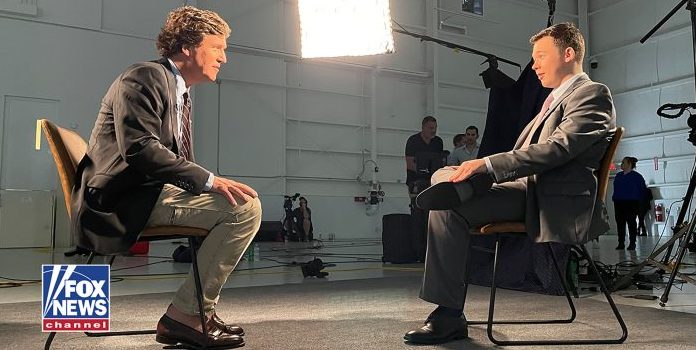On Monday, Fox News aired Tucker Carlson’s exclusive post-acquittal interview with Kyle Rittenhouse following his widely watched trial for killing two men and injuring a third in self-defense during riots last year in Kenosha, Wisc.
Carlson’s interview with Rittenhouse—taped two days after the jury’s verdict, according to the newscaster—was the first opportunity that the 18-year-old had to tell his side of the story, which has been widely distorted by leftist media.
“Kyle Rittenhouse did not go to Kenosha looking for trouble; his father lived there,” Carlson began, adding that “rioters threatened Rittenhouse’s life,” and forced him to act.
Turning to Rittenhouse, Carlson asked the teen to recount the events from his perspective.
“Kenosha is my community and I was upset to see my community up in flames,” he said, before reiterating that his father lived there and that he had real ties.
In an apparent bid to press for additional federal charges, leftists have belabored the point that his physical home with his mother was across state lines in Aurora, Illinois.
Rittenhouse, now an old pro at anticipating legal attacks after his ordeal of more than a year and a half, used the interview not only to out-maneuver his would-be assailants, but also to return fire with his own shot across the bow in what could be a series of major defamation cases—including one against now-President Joe Biden.
Legal experts have noted that a video the Democratic candidate released last year linking Rittenhouse to white supremacy would fit the legal standard of “actual malice” needed to defame a public figure.
Rittenhouse invoked the specific legal terminology during the interview and spoke of the harm that the baseless left-wing smear attacks against him had caused.
He implored Biden in particular to “understand the facts before you make a statement.”
Yet the Arizona State University student said he still maintains hope of resuming a quiet, normal life once the dust settles and pursuing a career in either nursing or law.
Much of the interview was focused on Rittenhouse making his case for self-defense to his detractors.
He spoke about seeing the community in shambles in the early morning hours before the shooting. He then stated that he “met with the owners of CarSource and offered to protect their business.” The owners’ other stores had already been torched, and he wanted to help.
Carlson interjected and asked Rittenhouse where the police were, and why they were not protecting private businesses, to which Rittenhouse replied that he was unsure.
He added that, “the National Guard should have been called…Tony Evers, the governor, failed the community…”
The riots, lawlessness, and absence of police came across clearly in Rittenhouse’s remarks, which led Carlson to comment that it was still “hard to imagine this [was] happening in an American city.”
Rittenhouse said the situation deteriorated throughout the evening, and that he noticed “there were rioters with firearms…I remember it very distinctly.”
There were other indicators that there would be problems.
As he had previously testified, Rittenhouse said that when he first encountered Joseph Rosenbaum on the street, he told him and his friends that, “If I catch any of you ‘MFers’ alone I am going to f-ing kill you.”
Carlson was surprised and asked for clarification. “He walks up and threatens to kill you out of nowhere?”
Finally, Rittenhouse concluded his retelling by describing the terror he encountered on the streets.
Police were nowhere and rioters were everywhere. He was chased and assaulted by a crowd, and was attacked with rocks and a skateboard — two aspects of the ordeal that are rarely covered.
Later on, Rittenhouse asserted that he rejected the politicization around his case. He disavowed the rioting, which he called “opportunist…[for] taking advantage of the BLM movement,” which he said he supported.
Ultimately, his ordeal was “100% self-defense from the very beginning” and had nothing to do with race or racism, per Rittenhouse.
Awful as the night of the shooting was, one of the worst aspects of Rittenhouse’s ordeal is less known. “Rittenhouse spent months in jail after turning himself into police, much of it in adult lockup, despite the fact he was a minor,” Carlson said.
The reason for this was because Rittenhouse’s attorneys, including prominent lawyer Lin Wood, left him there to raise funds off his name.
Wood, who also attached himself to the legal battles to challenge the 2020 election, has been criticized elsewhere as a self-promoting huckster. His high-profile separation from the Rittenhouse case was one of the first confirmations after a series of red flags.
“Lin Wood was raising money on my behalf and he held me in jail for 87 days … disrespected my wishes and put me on media interviews that I should never have done,” Rittenhouse said.
“They said I was safer in jail than at home with my family … by Sept. 5, I want to say, they had raised $1 million…I could have been bailed out by mid-September but they wanted to keep me in jail until Nov. 20,” he continued.
Although he described his prison stay as being like a “1-star hotel” with many amenities including phone, internet and television, Rittenhouse said the one thing his room lacked was running water. As a result, he did not take a shower for nearly three months, he said, reflecting back on his ordeal with good humor and graphic detail.
“”My skin was bleeding because my skin was coming off of my body. It is just the nastiest thing ever,” Rittenhouse said.
He said the three-hour car ride back after his release made matters worse because he “”smelt terrible.”

